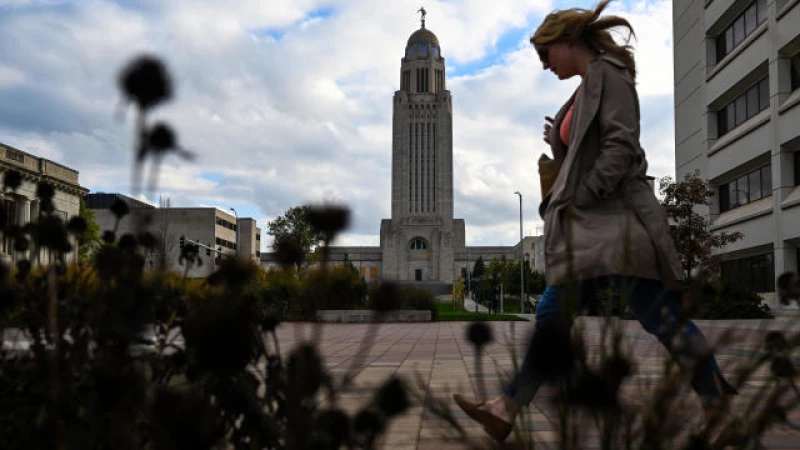A lone electoral vote in Nebraska could have a decisive impact on the 2024 presidential election.
And that reality is now being seized upon by prominent Republicans.
Nebraska is a reliably red state in presidential races. The last Democratic presidential candidate to win statewide was Lyndon B. Johnson over half a century ago.
But Nebraska is one of only two states — Maine is the other — that awards a portion of its respective electoral votes to the candidate who wins individual congressional districts. Its most closely watched electoral vote typically comes from an area that includes the major metro city of Omaha and is far more competitive than the rest of the state. The district's electoral vote has swung back and forth in recent cycles.
Republican Donald Trump won the district's electoral vote in 2016, but he lost it to Democrat Joe Biden in 2020. Democratic President Barack Obama lost it to Republican Mitt Romney in 2012, but had won it in his first run for the White House in 2008.
The 2024 Presidential Race: A Potential Showdown in the Omaha District
As the 2024 presidential election approaches, the rematch between Mr. Biden and Trump is shaping up to be a close race on a national level. Interestingly, in one particular scenario, the outcome of the presidency could hinge on who emerges victorious in the Omaha-based district. While the path to victory is not certain, the unique dynamics of the 2024 election cycle suggest that unexpected possibilities may quickly turn into reality.
If Trump manages to secure all the electoral votes he won in 2020 and successfully flips Arizona, Georgia, and Nevada - states that eluded him in the previous face-off against Mr. Biden - he would reach 268 electoral votes, just two votes short of reclaiming the White House.
On the other hand, if Mr. Biden retains the electoral votes he secured in 2020, including crucial states like Pennsylvania, Michigan, and Wisconsin, he would find himself just one vote away from securing a second term. In such a scenario, winning the Omaha congressional district in Nebraska would be the deciding factor for Mr. Biden to clinch the presidency outright.
The Electoral College Deadlock and Nebraska's Pivotal Role
If Trump manages to capture all of Nebraska's electoral votes, including the critical swing district in Omaha, the electoral college tally would stand at a deadlocked 269 to 269. This tie would then lead to the unprecedented scenario of the election outcome being decided by the U.S. House of Representatives.
Recent discussions have highlighted Nebraska's potential pivotal role in determining the next president. Charlie Kirk, the influential figure behind Turning Point USA, drew attention to this aspect by urging Nebraskans to voice their concerns to state legislators and the governor, calling for a halt to what he sees as a strategic advantage given to political adversaries.
He also called attention to a bill in the Nebraska Legislature that would shift the state to a winner-take-all system and end the practice of giving each congressional district its own electoral vote. He ended his message with an encouragement for people to reach out to the state's GOP Gov. Jim Pillen and "let him know you want this fixed."
Hours later, Pillen's office posted a statement on X, formerly known as Twitter, emphasizing his support for the bill and calling for the change to pass. And later that night, Trump himself posted on social media applauding the governor's statement.
CBS News has reached out to the Biden campaign and Republican Congressman Don Bacon, who represents Omaha's congressional district, for comment.
Jane Kleeb, chair of the Nebraska Democratic Party, said in a statement that "Nebraskans want to keep our fair electoral system in place which is why previous attempts by some Republicans over the last thirty years have failed to undo our split electoral votes."
All that talk doesn't mean that the Nebraska Legislature is ready to plow ahead and upend the state's electoral system, despite the strong GOP nature of the state. But the surge in attention points to how close the 2024 election could turn out to be.
"It's pathetic," Nebraska State Sen. Megan Hunt, who is not a Biden supporter and represents part of Omaha, said in a text message to CBS News when asked about the GOP push. "And if [Trump] wants to win Omaha's vote, he should come earn it."
A recent study has found that the majority of people prefer working from home rather than going back to the office. The study, conducted by a team of researchers, surveyed over 1000 employees from various industries and found that 75% of them expressed a preference for remote work. According to the study, the main reasons cited for preferring to work from home included increased flexibility, better work-life balance, and avoiding long commutes. Many employees also reported feeling more productive and focused when working remotely. While some companies have already started transitioning back to in-person work, the study suggests that a significant portion of the workforce may resist this change. Employers will need to consider the preferences of their employees and find a balance that meets both the needs of the company and the desires of their workforce.







